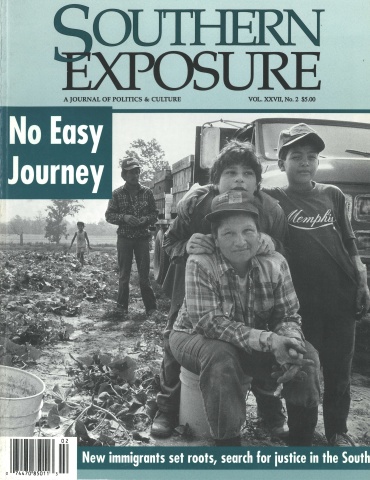This Land is Whose Land?

This article originally appeared in Southern Exposure Vol. 27 No. 2, "No Easy Journey." Find more from that issue here.
This article draws heavily on materials published by Alison Brown of the Immigrants Legal Assistance Project of the N.C. Justice and Community Development Center.
A lot has changed in the hundred or so years since Emma Lazarus authored these words to honor liberty—and to welcome immigrants to America. A look at how recent immigration policies measure up to our country’s stated ideals:
Give me your tired, your poor,
(But only if they have connections. A common way for individuals to seek entry into the U.S. is to have a relative sponsor their application. Under the Illegal Immigration Reform and Immigrant Responsibility Act of 1996, a sponsor must prove they have a hefty income to support the applicant and sign an “affidavit of support”—guaranteeing that they will pay back the government for any public benefits an immigrant might receive before they have completed work requirements that take a minimum of ten years. Failure to pay back such aid can lead to stiff fines.)
your huddled masses yearning to breathe free,
(Know that freedom in the U.S. for immigrants means carrying your papers at all times and presenting them to the authorities, who will often stop you on appearance alone. Workplace raids and “cooperation” between INS agents and local law enforcement have left thousands of immigrants, regardless of documentation, fearing for their families and livelihoods.)
The wretched refuse of your teeming shore,
(Thanks to 1996 changes to federal welfare laws, agencies administering Temporary Assistance to Needy Families [welfare], public housing, and supplemental social security income [for the disabled] now have an obligation to report to the INS names and addresses of individuals “known to be in violation of immigration laws.” While agency representatives will rarely actually “know” someone is in violation of the law, the change itself sends a clear message that immigrants are not welcome in those offices. What happens to people detained by the INS? In a recent report, the Human Right Watch found that two-thirds of 16,000 individuals detained by the INS were held in local jails rather than federal facilities.)
Send these, the homeless,
(Under welfare reform, Congress set sweeping rules that have greatly restricted access to food stamps, cash assistance, and other forms of public aid for immigrants. While they have carved out some exceptions, allowing immigrants access to emergency services like ambulances—the overall message is clear—immigrants are second class.)
Tempest-tossed, to me:
(But expect no safe port at our shores. Under the 1996 immigration law, border patrol and INS agents who merely suspect irregularities in an immigrant’s paperwork now have the authority to send individuals back to their home countries without even providing them with a formal hearing or a chance to seek legal advice. Even immigrants who are fleeing persecution in their homeland can be returned without so much as a hearing before an immigration judge if they fail to comply with technical requirements for requesting asylum.)
I lift my lamp beside the golden door.
(To see who’s coming this way! According to the National Network for Immigrant and Refugee Rights, the INS currently has more armed agents than any other federal civilian agency.)
Tags
Keith Ernst
Keith Ernst is an attorney for the Center for Responsible Lending, and a member of the editorial board of Southern Exposure. (2003)